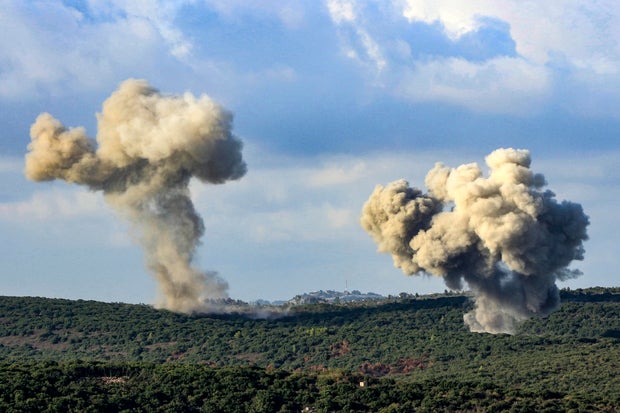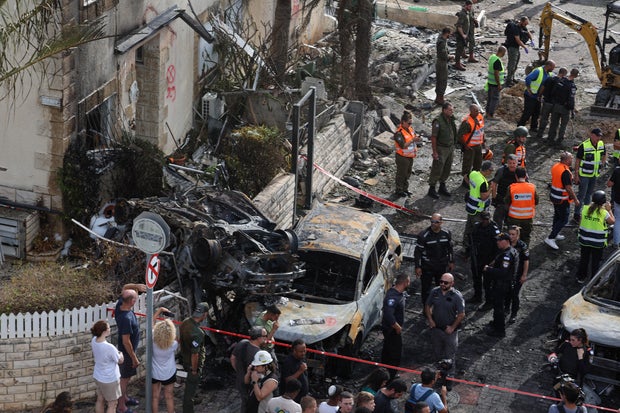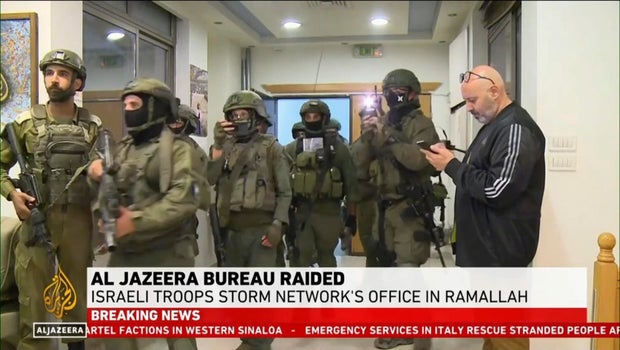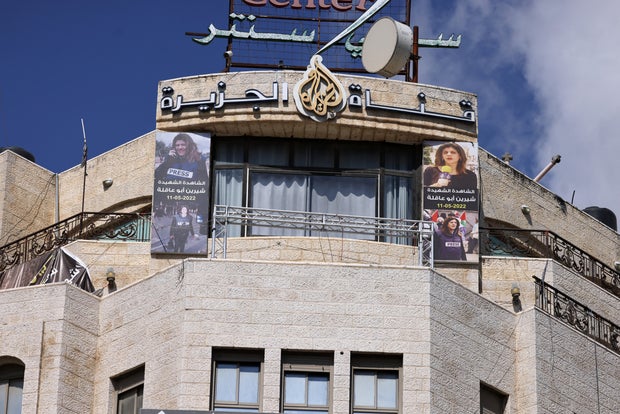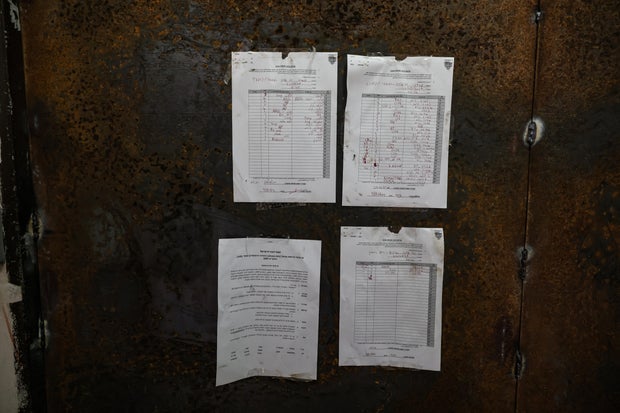Israel and Hezbollah trade heavy fire as cross-border strikes escalate

Israel and Hezbollah continued to trade hundreds of strikes on Sunday as the sides appeared to be heading for an all-out war following months of tensions.
An Iranian-backed militant group launched more than 100 rockets at a wide and deep area in northern Israel, with some landing near the city of Haifa. The overnight chaos triggered alarm in northern Israel, sending thousands of people into shelters.
Israel’s military said the rockets were fired at “civilian areas,” hinting at a possible escalation after previous attacks had mostly targeted the military.
JACK GUEZ/AFP via Getty Images
Avi Vazana ran to a shelter with his wife and 9-month-old child before he heard the rocket blast in Kiryat Bialik. He then went back outside to check if anyone was hurt.
“I ran with no shoes, no shirt, only wearing panties, I ran to the house while everything was burning trying to find out if there are other people,” he said.
Hezbollah’s deputy leader Naim Kassem said his group is now in an “open war of retaliation” with Israel, threatening to evict more people from northern Israel.
“We admit that we are in pain. We are human beings. But as we are in pain – you will also feel pain,” Kassem said at the funeral of Hezbollah’s top commander Ibrahim Akil. He said the dozens of rockets fired by the group into Israel early Sunday were just the beginning, vowing to destroy Israel’s economy.
One rocket hit a residential building in Kiryat Bialik, a community near Haifa, injuring at least three people and burning buildings and vehicles. Israel’s rescue unit, Magen David Adom, said four people were injured by explosives in the incident.
Meanwhile, Israel launched hundreds of strikes on Lebanon. The Ministry of Health in the country said that two people died and one was injured due to Israeli strikes near the border, although it did not provide further details.
The Israeli army said it carried out a wave of strikes in southern Lebanon in the past 24 hours, hitting about 400 terrorist positions, including with rocket launchers. Lt. Col. Nadav Shoshani, a spokesman for the Israeli military, said the strikes had foiled a larger attack.
“Hundreds of thousands of civilians were heavily attacked in northern Israel. They spent all night this morning in bomb shelters,” he said. “Today we have seen a fire that has entered Israel more than before.”
KAWNAT HAJU/AFP via Getty Images
The military also claimed to have intercepted several planes that were shot down near Iraq, after Iran-backed terrorist groups attacked Israel.
Prime Minister Benjamin Netanyahu said Israel will take whatever steps are necessary to restore security in the north and allow people to return to their homes.
“No country can accept the robbery of its cities. We will not accept it either,” he said.
Israeli President Isaac Herzog said “Face the Nation with Margaret BrennanOn Sunday that his country “did not want this war” but that “it was fought on us by the representatives of the evil regime of Iran, on October 7 by Hamas, and on October 8 by Hezbollah.”
“And since, from Lebanon in the north, and, of course, from Hamas in the south and throughout the Middle East, the proxies of Iran are attacking and attacking now,” he added.
Israeli media reported that rockets fired into Lebanon early Sunday were intercepted in the Haifa and Nazareth areas, which are the most southerly of the rockets so far. Israel canceled school in the north, deepening the sense of hardship.
JACK GUEZ/AFP via Getty Images
Hezbollah said it launched dozens of Fadi 1 and Fadi 2 missiles – a new type of weapon the group had never used before – at the Ramat David air base, southeast of Haifa, “in response to repeated Israeli attacks targeting various Lebanese regions.” and it led to the fall of many ordinary martyrs.
Chaos came after Israeli airstrikes in Beirut on Friday killed at least 45 peopleincluding one of Hezbollah’s top leaders. Hezbollah has vowed to take revenge on Israel for the wave of explosives that attacked pagers and walkie-talkies members of Hezbollah on Tuesday and Wednesday, killing at least 37 people – including two children – and wounding around 3,000. The attack was widely blamed on Israel, which neither confirmed nor denied responsibility.
Israel and Hezbollah began trading fire when the war in Gaza almost one year ago/hub/cmsframework/reroute/content_collection/2dd9ad74-5028-48d6-8b74-8bfc348c319a#link={when the terrorist group started firing rockets in cooperation with the Palestinians and their pro-Iranian partner Hamas. Low-level fighting has killed dozens in Israel, hundreds in Lebanon and displaced tens of thousands on both sides of the border.
Al Jazeera’s West Bank office was raided by the Israelis
In the Israeli-controlled West Bank, Israeli soldiers stormed the offices of the Al Jazeera satellite news network, ordering the office to be closed.
Al Jazeera / AP
Armed Israeli soldiers entered the office and told the reporter on the air that it would be closed, and said that the workers must leave immediately. The network later broadcast what appeared to be Israeli soldiers tearing down a banner from a balcony used by an Al Jazeera office.
“There is a court order to shut down Al Jazeera for 45 days,” an Israeli soldier told Al Jazeera chief Walid al-Omari in live footage. “Please take all the cameras out of the office right now.”
Al-Omari said that the Israeli army started confiscating documents and equipment from the office, as the explosion of tear gas and guns could be seen and heard in the area.
JAAFAR ASHTIYEH/AFP via Getty Images
Al Jazeera broadcast live footage of Israeli soldiers on its Arabic-language channel ordering the office to be closed for 45 days. This follows an order issued in May where the Israeli police raided Al Jazeera’s broadcast center in East Jerusalemit seizes equipment there, blocks its broadcasts in Israel and blocks its websites.
The move marked the first time that Israel has ever shut down a foreign media outlet operating in the country. However, Al Jazeera continued to operate in the Israeli-occupied West Bank and Gaza Strip, areas the Palestinians hope to have in their future state.
The Israeli military did not respond to a request for comment from The Associated Press. Al Jazeera has condemned the move as it continues to broadcast live from Amman, Jordan.
JAAFAR ASHTIYEH/AFP via Getty Images
Israel’s Communications Minister Shlomo Karhi later described the attack as disrupting “the underground of Hamas and Hezbollah,” the Shiite militias in Lebanon where Israel launched an attack on Sunday after cross-border militants opened fire.
“We will continue to fight against enemy stations and ensure the safety of our brave soldiers,” Karhi wrote on X. He did not mention which authority Israel said ordered the office to be closed.
The Palestinian Journalists Syndicate condemned the attack and the organization of Israel.
“This military decision, which was without reason, is a new violence against the work of journalists and the media,” it said.
Criticism of Al Jazeera is not new. Washington appointed the broadcaster when the US invaded Iraq after its 2003 invasion toppled dictator Saddam Hussein and broadcast videos of Osama bin Laden.
Al Jazeera has been shut down or blocked by some governments in the Middle East.
Source link


